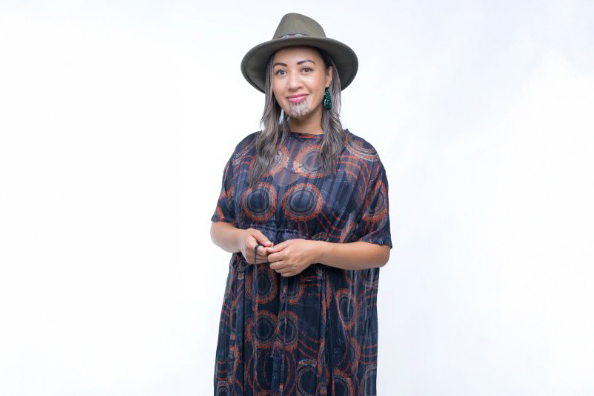William Cuthers (far left) and whanau, with (seated on chair) Her Royal Highness Princess Mele Siu’ilikutapu Kalaniuvalu Fotofili of Tonga.
An academic article written by a Te Wānanga o Aotearoa tauira has been given the seal of approval from the highest level.
William Cuthers’ article - The Significance of Stories – was published in Te Kaharoa: The eJournal on Indigenous Pacific Issues after being endorsed by Her Royal Highness Princess Mele Siu’ilikutapu Kalaniuvalu Fotofili of Tonga.
William is studying towards the He Waka Hiringa - Master of Applied Indigenous Knowledge degree at the Māngere campus of Te Wānanga o Aotearoa. His indigenous practice is the promotion of Māori and indigenous identity for positive development of Māori and indigenous youth. The Significance of Stories is the latest in a string of articles William has had published during his studies.
He says the article explains how the Mana Model he developed to help explain his understandings of identity are not just confined to his family.
William uses the Mana Model to explain how relationships between whānau, whenua and rangatira each contribute to a person’s identity. In The Significance of Stories he explains how those understandings are not just confined to a person’s own family, but their wider whānau too.
He says the endorsement from Her Royal Highness Princess Mele Siu’ilikutapu Kalaniuvalu Fotofili came about because of his wife’s mother.
“My mother-in-law Peta descends from the last Tu’i Tonga and in discussing her family stories it was appropriate that if I was to have this article published I should seek approval from HRH Princess Mele Siu’ilikutapu. I accompanied my mother-in-law and my wife and children to meet with the Princess and spoke to her about my writing and the significance of recording our stories.”
The Significance of Stories follows three earlier published articles. Two of them, Reclaiming Identity and The Mana Model, covered William’s discovery of his own identity. The Mana Model explores William’s Ngāti Tamainupō and Tainui whakapapa and how that contributes to his identity.
“I place myself in my writing and discuss my family stories and my history from my perspective, which comes from my view of Māori and indigenous identity viewed through my Mana Model.”
The third publication - Chief, Family and Land - discusses his descent from Tinomana Ariki of Pua’ikura, Rarotonga, the significance of family stories and how they also contribute to identity.
For his He Waka Hiringa project this year, William is writing a book of stories of his children’s great grandparents, as viewed through his Mana Model.
“I also include the different genealogies of my children to demonstrate the significance of their mixed ancestry. It is my goal that the book is a catalyst for wider members of the community to start researching and recording their own stories.”
His articles have led to invitations to be a guest lecturer and William says his writing has developed through his time studying at Te Wānanga o Aotearoa.
“I would not have had these opportunities if I didn’t engage in the (He Waka Hiringa) programme the way I have.”




































